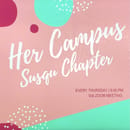My favorite genre consists of fantasy series with strong female characters, preferably a series written by female authors. Don’t get me wrong – I love some of the classic fantasy books, such as The Hobbit, The Name of the Wind, The Chronicles of Narnia, and The Once and Future King, but I get more out of books that are written by women. Fantasy books by men usually have few, if any female characters, and they definitely aren’t strong, independent women. Since I’ve already devoured classic fantasy novels by Ursula Le Guin, Susanna Clarke, and Diana Wynne Jones, I am always searching for new fantasy books. One of my recent favorites is the A Court of Thorns and Roses series by Sarah J. Maas. What I love about these books is that, not only do the female characters pass the Bechdel test thousand times over, but the series discusses taboo social issues such as men being survivors of assault, mental illness, classism, and sexism. While most people have positive things to say about this series, there are valid criticisms just like every book series receives. However, when the latest novel was published last month, there was outrage all over social media. I had already preordered a copy of the book at this point, and since I was dying to know what had happened to my favorite characters, I read the book anyway. Part of my reasoning for this decision is that I personally don’t believe in books being banned or burned, no matter what words are in them. Don’t get me wrong – there are numerous problematic books I refuse to read, but I think literature is too precious to destroy.

Before I started reading the book, I wanted to understand why so many people were upset about the A Court of Silver Flames being published. The #booktok community on TikTok had several informative videos explaining why some fans were protesting the book’s publication. Most of these critiques involve a lack of diversity and representation in the series, specifically that almost every character is heterosexual and white. I agree with this, especially since one of my favorite characters in another series by the same author, Sarah J. Maas, was killed off by book two even though she was the only woman of color in the series up until that point. What I do admire about this author is that her books include a strong feminist message about all women being equal, and Maas consistently makes her social media accounts inclusive and safe spaces for fans. While I’m surprised by the lack of diversity in The Court of Thorns and Roses series, I can understand where it comes from. As someone who is white and asexual but is straight-passing, I usually gravitate towards those kinds of characters. In my own writing, I don’t consciously write straight or asexual characters, but the few times I do, they are the easiest characters for me to create because I relate to them. I’m sure, like most authors, Maas unconsciously created characters that shared the same traits as her.
Before I continue, I just want to reiterate that I’m not trying to make excuses for white authors. However, hopefully, I can provide an alternative perspective on why we shouldn’t think the worst of authors. What I wasn’t prepared for was the hate Maas fans would receive. For those who posted about purchasing or reading A Court of Silver Flames on TikTok, some of them received death threats and hateful messages. Now it’s one thing to not like someone’s video, but threatening them? This blew my mind! Luckily, there are plenty of kind #booktok accounts that admonished this behavior, and I’ve seen a lot less hate in the past few weeks. I truly believe there is a productive way that we can all talk about problematic books without insulting each other.

What are some possible solutions? I believe that if you’re going to read a book with a lack of diversity, make sure to read it alongside other books by BIPOC authors that include a diverse representation. Start researching ways to be a more informed reader, and don’t be afraid to ask your friends for book suggestions! Goodreads also has some awesome lists of BIPOC novels recommended. Most importantly, what the book community needs to remember is that there’s a big difference between a lack of diversity in a book and negatively misrepresenting minority people.




